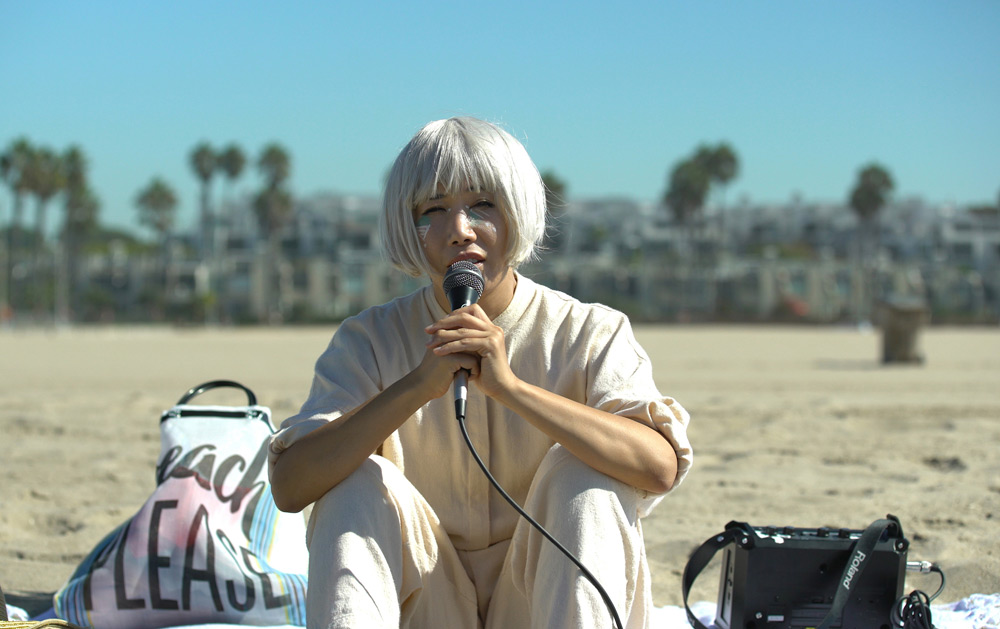The opening shot of “White Rabbit,” a collaboration between director Daryl Wein and performance artist Vivian Bang, carries more and more weight as the film unfurls, depicting Bang’s onscreen alter ego Sophie silently screaming into a microphone before launching into a monologue, imagining herself as a Korean-American immigrant struggling to make ends meet at the height of the L.A. Riots. Sophie invests herself fully and passionately into the performance, shouting into a small, black Roland microphone/speaker kit that offsets the all-white drapery she drifts in and out of public places in and as the camera pulls back to reveal she’s in a supermarket where customers with shopping carts pay her no mind in spite of how unusual she is, you realize she’s screaming into the void. Never mind that she makes no money for these public displays – she receives no attention.
The lack of both are what gives rise to the tension in “White Rabbit,” a compelling comedy in which Bang navigates an artist’s life in Los Angeles, picking up menial on-call gigs through TaskRabbit while putting her all into more personally meaningful, but potentially even more demeaning work performing for strangers on the streets. The abstract markers of success beyond crowd size and her bank account, which one has to assume is relatively meager yet enough to afford a one bedroom in the city, bedevil Sophie, who in doing something original, has few peers as guides, but Wein and Bang figure out ways to bring certain achievements into focus when Sophie is approached by a photographer named Victoria (Nana Ghana), who is ten years removed from immigrating from Ghana. While Victoria admires Sophie’s daring to perform her monologue in a public park, Sophie is more impressed by Victoria’s freedom, seemingly unbound from the fear and insecurities about what she’s putting into the world.
Although the delicate dance between the two, in which assumptions are made and upended about who they are and who they present themselves to be, drives “White Rabbit,” the film finds an equally provocative strand in watching Sophie begin to engage with the world, not in the hypothetical way she does with secondhand knowledge of events that happened before her time or even physically, by throwing herself into public performances without any appreciation for any response beyond praise. After an early, clever illumination of her selfishness by inviting over an ex-girlfriend who’s clearly moved on, to tell her “I want to keep thinking about you,” uninterested in whether the feeling is reciprocated, the joy comes in seeing Sophie finally glean the life experience to see beyond herself and have the ability to create something that will be meaningful to others.
Wein keeps things loose and although the clearly improvisational nature of some scenes gives the film some rough edges, “White Rabbit” benefits from handling its heavier ideas about identity politics and what constitutes art with a light touch. Bang is a naturally charismatic figure who shows a sense of humor about her work, as does Wein, who likely provided a few notes to heighten the awkwardness of a scene in which Sophie finds herself in the predicament of securing a part in an indie film if only she’d put on a heavy Korean accent (“You know, like your video [of your performance piece],” says the white male director, blissfully ignorant of what he’s asking.) Capturing the absurdity of the compromises Sophie has to make on a daily basis as an artist, especially one of color, “White Rabbit” finds many laughs, but in making an uncompromised piece of art on their own, the filmmakers pinpoint Sophie’s quite real conundrum, turning her silent screaming into the loud roar of someone with something important to say.
“White Rabbit” does not yet have U.S. distribution.




